人教版高中英语必修1 Unit2 English around the world Warming up and Reading课件(106张PPT)
文档属性
| 名称 | 人教版高中英语必修1 Unit2 English around the world Warming up and Reading课件(106张PPT) |
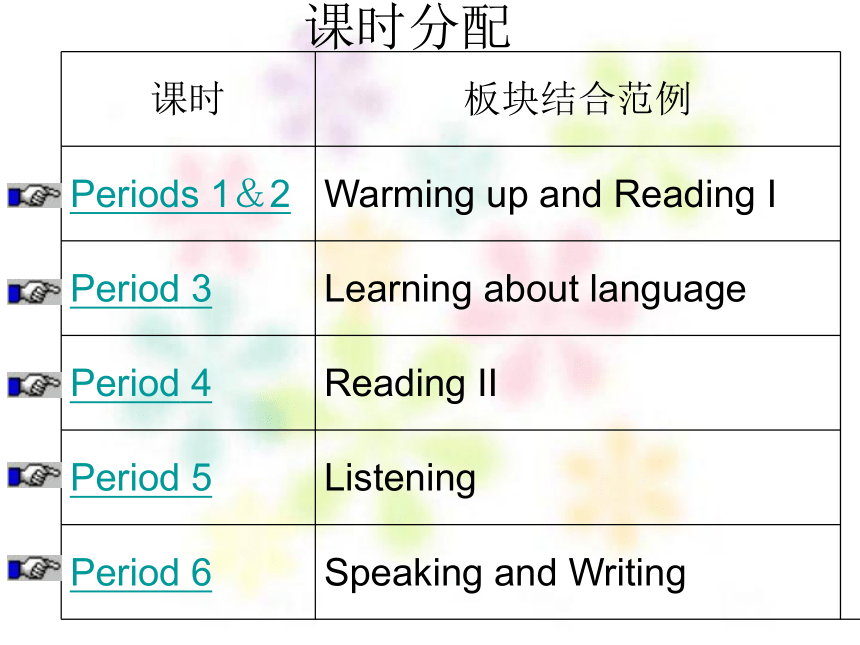
|
|
| 格式 | zip | ||
| 文件大小 | 542.8KB | ||
| 资源类型 | 教案 | ||
| 版本资源 | 人教版(新课程标准) | ||
| 科目 | 英语 | ||
| 更新时间 | 2018-09-07 00:00:00 | ||
图片预览

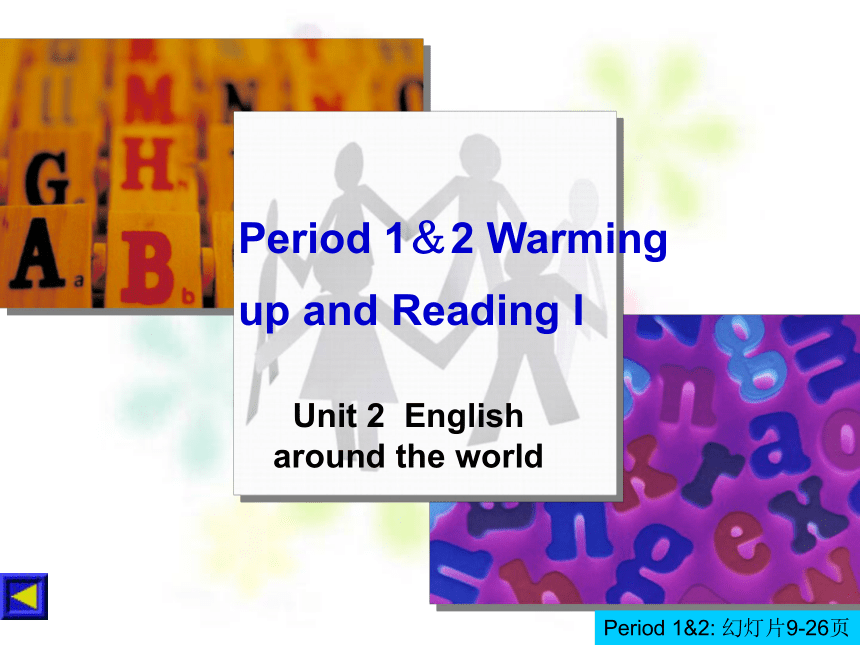
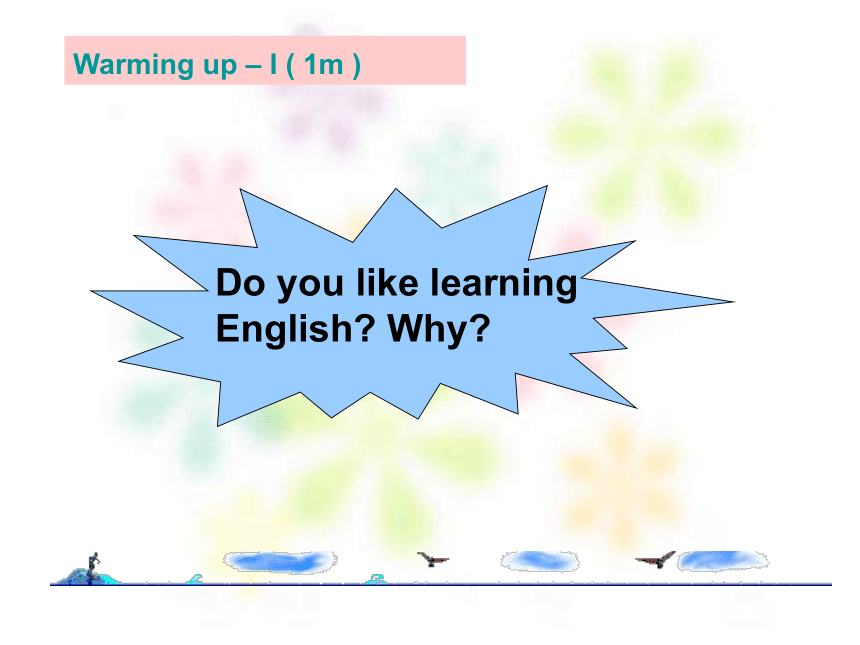
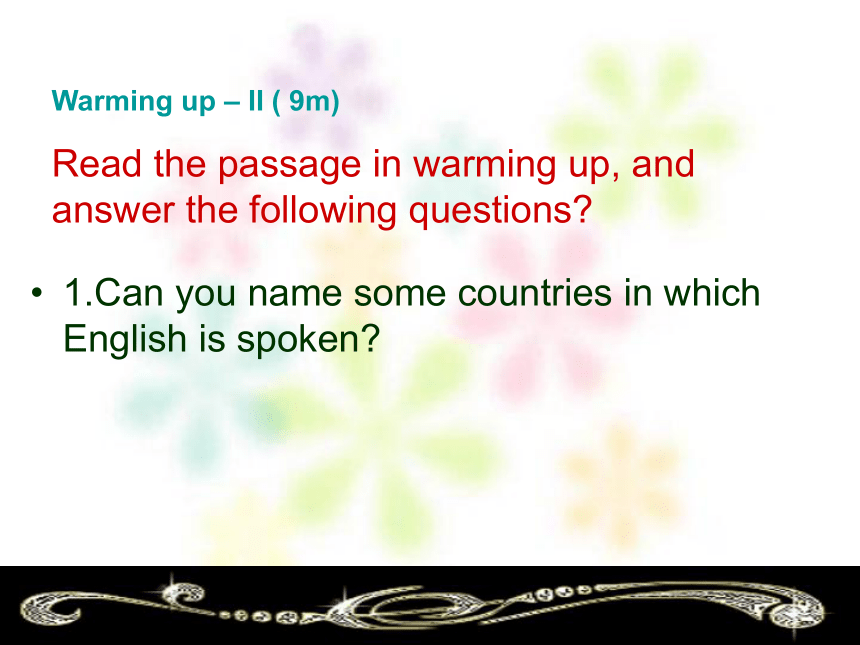


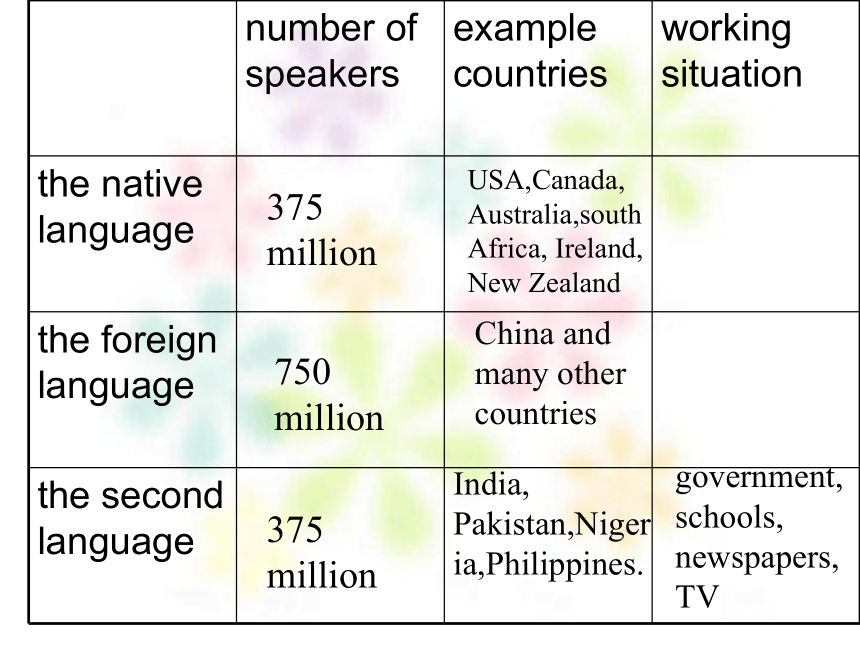
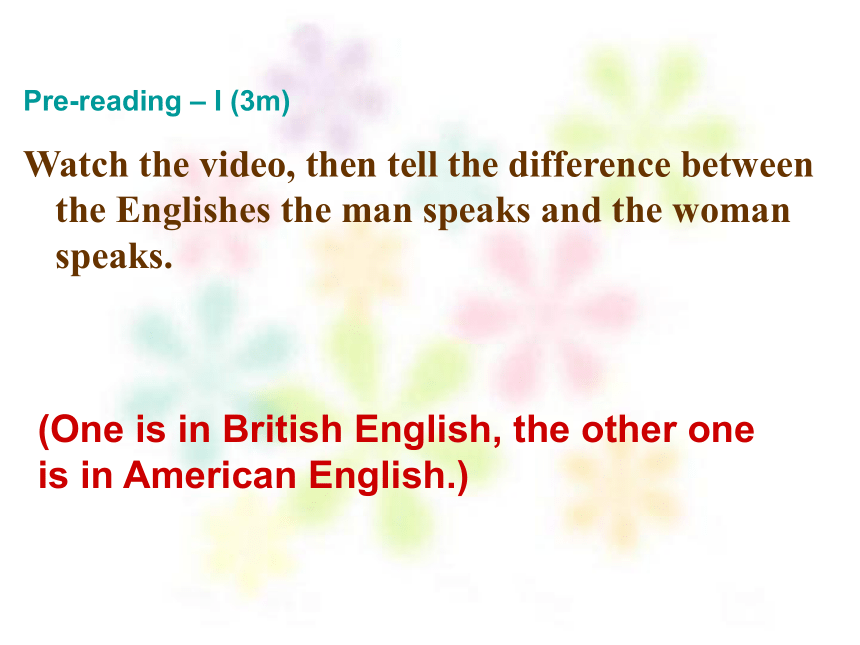
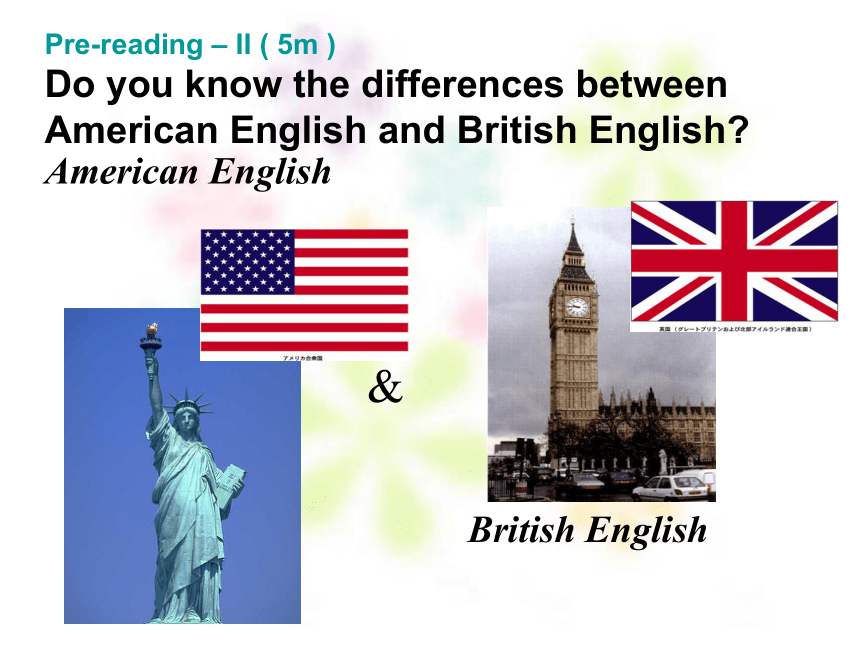
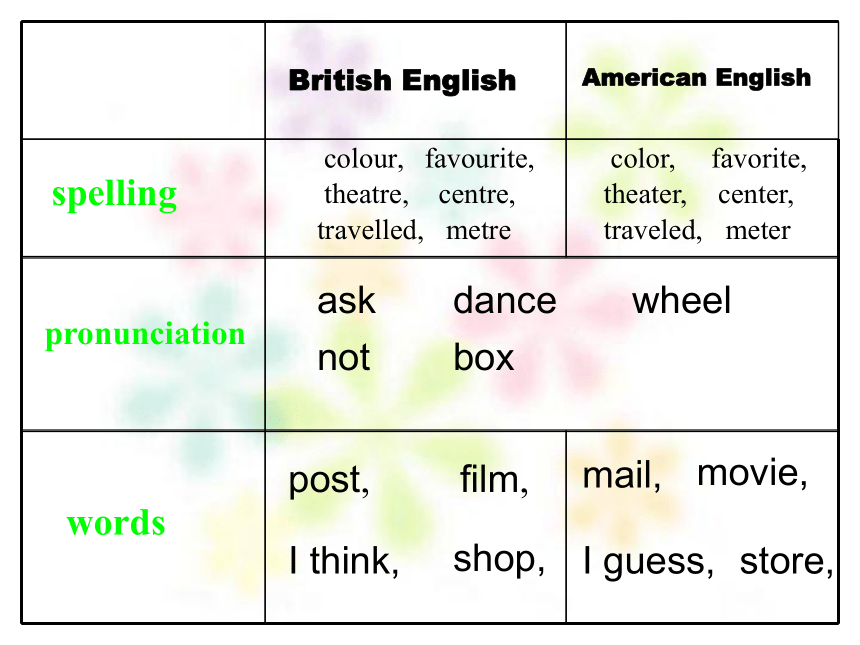
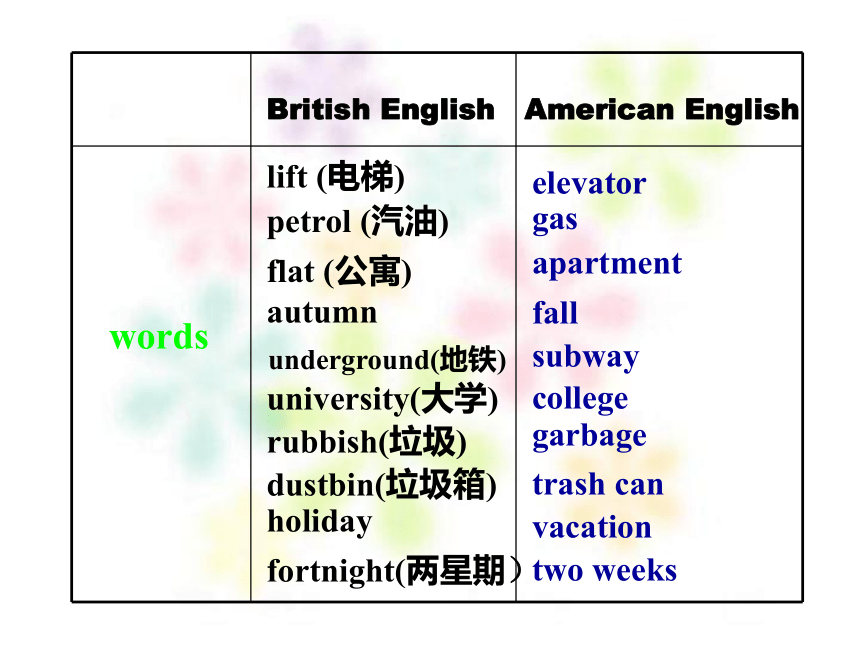
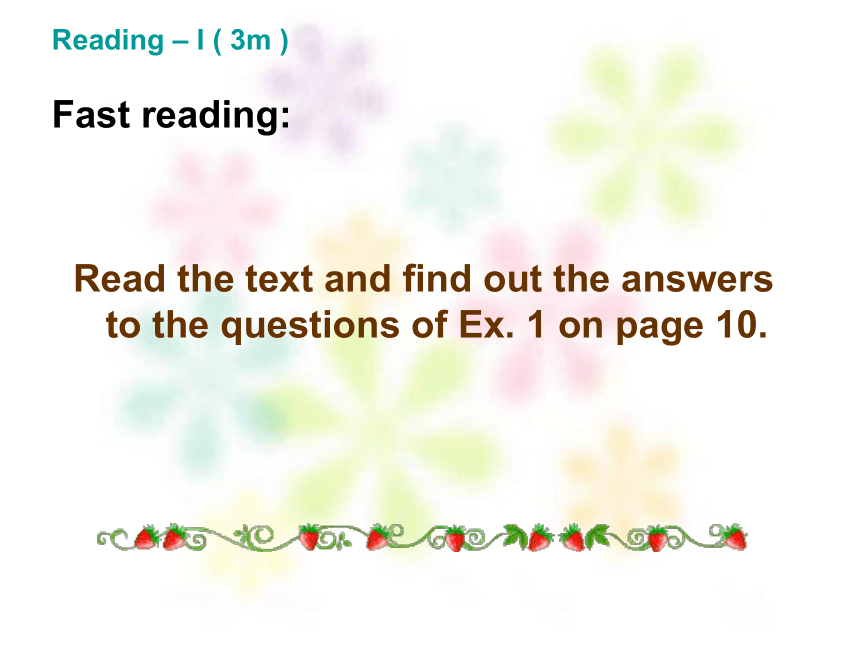
文档简介
课件106张PPT。课时分配Period 1&2 Warming up and Reading I Unit 2 English around the worldPeriod 1&2: 幻灯片9-26页Do you like learning English? Why?
Warming up – I ( 1m ) 1.Can you name some countries in which English is spoken?
Warming up – II ( 9m)
Read the passage in warming up, and answer the following questions?English Around the Worldthe USACanadaNew ZealandAustraliaSouth Africathe United KingdomIreland 3.Do you know how many people use English as their native language, second language, or foreign language? 2. Are the English in those countries the same?
375 million750 million375 millionUSA,Canada,Australia,south Africa, Ireland, New ZealandChina and many other countriesIndia, Pakistan,Nigeria,Philippines.government,schools, newspapers,TVPre-reading – I (3m)
Watch the video, then tell the difference between the Englishes the man speaks and the woman speaks.(One is in British English, the other one is in American English.)British EnglishAmerican English&Pre-reading – II ( 5m ) Do you know the differences between American English and British English?
British EnglishAmerican Englishspellingpronunciationwordscolour,color,favourite,favorite,theatre,theater,centre,center,travelled,traveled,metremeteraskdancewheelnotboxpost,mail,film,movie,shop,store,I think,I guess,British EnglishAmerican Englishwordslift (电梯)elevatorpetrol (汽油)gasflat (公寓)apartmentautumnfallunderground(地铁)subwayuniversity(大学)collegerubbish(垃圾)garbagedustbin(垃圾箱)trash canholidayvacationfortnight(两星期)two weeksReading – I ( 3m ) Fast reading:Read the text and find out the answers to the questions of Ex. 1 on page 10.
1. Read the text and try to find the main idea of each paragraph. (Work in pairs)
Reading – II ( 10m ) Pair work:2. Check the answers.
Ask some students to tell their answers, after giving the answers, they should also tell how they find the answers, then give the suggested answer.Paragraph 1: describes the extension of English in the world.
Paragraph 2: tells us native speakers can understand each other but not everything.
Paragraph 3: tells the development of English as native language.
Paragraph 4: tells us English is spoken as a foreign or second language in many countries.Reading – III ( 5m ) Group work: What can you learn from this passage? (discuss in group of four, then ask the students to show their ideas.)
The aim of this step is to help the students realize the importance of English.Post-reading ( 5m )1. Do you think it matters what kind of English you learn, why?
2. Why do you think people all over the world want to learn English?
3. Will Chinese English become one of the World English?(Students give their own answers.)Language points for Reading IAssignment1. Try to remember the English meaning of the new words in Reading I.
2. Prepare for the next class.
3. Finish the exercises on WB.Take a break!Period 3 Learning about language Unit 2 English around the worldPeriod 3: 幻灯片27-48页Revision ( 3m ) Match: (Reivew the new words) 1.come up
2.culture
3.actually
4.present
evidence of intellectual development of (arts, science,etc.) in human society.
reach;close to
Being in the place in question;existing now.
In actual fact;really
E. for example F. govern;have authority (over). G. who sb is; what sth is H. way of using sth; treatment. 5.rule
6.usage
7.identity
8.such as
Checking answer – I (1m) Answer keys for Ex.1 on Page 11:1 C 2D3E4F5A6B7J8G9I10HDatabaseDatabaseDatabaseIt is not easy for a Chinese person to speak English as well as a _____________ ________. This is _________ because the ___________ and usage are different in different parts of the English speaking world. If you say “flat" instead of “_________", people in America will not think you speak good English. If you use the word _________ instead of “lift" in Britain, they will look at you a little strangely! It seems you cannot win!Checking answer – II (2m) Answer keys for Ex.2 on Page11:native EnglishspeakeractuallyvocabularyapartmentelevatorChecking answer – III (2m) Answer keys for Ex. 3 on page 11:includes
cultures
present
Actually
usage6. gas
7. international
8. Rapidly
9. However
10. government
Learning useful structure – I ( 2m ) Say the following sentences to three students: S1: Open the window.
S2: Pass on the book to your deskmate.
S3: Will you please close the door.
Then ask:
What is the difference among the sentences I spoke to them just now?Help the students understand what is a command or a request.Learning useful structure – II ( 2m ) Make clear the difference between commands and requests and finish the following exercises:Go and collect the wood right now.
Could you go and get the shopping bags, please?
Shut the door at once.
Go and get my coat.
Would you please get that book for me? (C)(R)(C)(C)(R)Learning useful structure – III ( 2m ) Find the rules:Ask the students to finish the following exercises, and try to find the rules. “Make sure the door is open.” the teacher said to me.
The teacher told me to make sure the door is open.
“Don’t play games in the classroom.” the monitor said to us.
The monitor told us not to play games in the classroom.
“Will you please not smoke here?” she added.
She asked me not to smoke here.Learning useful structure – IV (10 m )
Rules and practice of direct and indirect speech 当直接引语为祈使句时,转换为间接引语要用一个带动词不定式的简单句表示:
祈使句 直引:主语+动词+“祈使句”
间引:主语+动词+to Verb
e.g. The teacher said to me, “Come in .”
—The teacher told me to go in 。
John said to me , “Please shut the window。”
—John asked me to shut the window。
The teacher said to me, “ Don’t be late again.”
---- The teacher advised me not to be late again. 特别提醒 1.祈使句变为间接引语,主要使用动词不定式。
2.谓语动词要做一定变化。
表示命令,用tell,order,command等。
表示请求,用ask,beg,request等。
表示忠告,用 advise。 Open the window.Direct speechIndirect speechMiss Hu told ** to
open the window.Will you please
open the window?Miss Hu asked ** to
open the window.toldtoaskedtoDon’t open
the window.Miss Hu told ** not
to open the window.not“Write a letter to your parents.”
“Don’t play games in the classroom.”
“Can you pass on the book to Tom?”
“Will you please not smoke here?”The teacher told me to write a letter ….The teacher ordered me not to play games ….The teacher asked me to pass on …The teacher asked me not to smoke there.Try to do this:“It is a fine day. Let’s go to the country
for a picnic.” Peter said to me.Peter said that it was a fine day and
asked me to go to the country for a
picnic with him.Peter told me that it was a fine
day and let us go to the country
for a picnic.? 感叹句 直引:主语+动词+“感叹句”
间引:主语+动词+陈述句
e.g. He said, “ what a fine day it is !”
He said , “ How fine the day is !”
He said what a fine day it was . He said how fine the day was . He exclaimed that it was a fine day.
特别提醒 1. 间接感叹句的动词应该是cry 或exclaim 。
2.可以仍用what,how 等词,语序不变,也可以用that 从句,把动词say 改为cry,shout,exclaim 等。
1.He said to Tom, “Don’t do the work any more.”He told Tom not to do the work any more.Practice2.Mrs. Green said, “Please sing us a song, Miss White.”
3. “Be quiet, children.” said Mrs. Wilson.Mrs. Green asked Miss White to sing them a song.Mrs. Wilson told the children to be quiet. 4. All the people cried, “What magnificent clothes
these are!”
All the people cried what magnificent clothes these were.高考链接:
We won’t give up _______ we should fail 10 times.
( 1993年上海 )
A. even if B. since C. whether D. until
2. — I don’t have any change with me. Will you pay the fare for me?( 2000年上海)
---- ________ .
A. That’s fine B. Nothing serious
C. Never mind D. No problem
3. ---- Do you mind if I keep pets in this building?
---- _______ .(2000上海)
A. I’d rather you didn’t, actually
B. Of course not, it’s not allowed here
C. Great! I love pets D. No, you can’t
4. The teacher asked us ____ so much noise.(2003年北京)
A. don’t make B. not make
C. not making D. not to make
5. Visitors ____ not to touch the exhibits.
(NMET2001)
A. will request B. request
C. are requesting D. are requestedAssignment1. Try to remember the rules of direct and indirect speech.
2. Finish the exercises on WB.
3. Prepare for the next class. Period 4 Reading II Unit 2 English around the worldPeriod 4: 幻灯片49-70页?Warming up – I ( 3m )
How many dialects are there in China ?dialects family in China 北方方言吴语闽南语客家话湘语赣语粤语Chinesedialects in
Guangdong province粤方言客方言闽方言代表地区
梅州地区
广州代表代表地区
潮汕地区Warming up – II ( 2m )Do you think there are some dialects in English?English dialects in different countriesBritainThe U.S.ACanadaAustraliaIndiaNew ZealandReading – I (1m ) Fast reading: Read the text on page 13 for 1 minute and answer the following question.
Is there standard English?
Reading – II ( 5m ) Detailed Reading Read the text for 3 minutes and answer the following question.
1.How many dialects of American English have been listed in the text?
2.Why do people from both Northeastern and Southeastern of U.S. speak with almost the same dialect? And what kind of dialect is it?
3.Why are there so many dialect in American English?1.How many dialects of American English have been listed in the text?
midwestern, southern, African American, Spanish
2.Why do people from both Northeastern and Southeastern of U.S. speak with almost the same dialect?
Because when Americans moved from one place to anther, they took their dialects with them.
3.Why are there so many dialect in American English?
That’s because people come from all over the world. And geography plays a part in making dialects.
Reading – III ( 10m ) Reading Task on page 52 Read the passage on Page 51 & 52, then fill in the following form:ScotlandAssignmentReview all the new words and expressions.
Finish the exercises on the exercise books.
3. Prepare for the next class.Take a break!Period 5 Listening Unit 2 English around the worldPeriod 5: 幻灯片71-79页Ask some students to tell the words that are different in American English & British EnglishRevision ( 2m )Listening – I ( 5m ) Ex. 5 on Page 12. Listen to these dialogues. Find the British and American words which are different but have the same meaning.
Dialogue 1: candy----sweets
Dialogue 2: truck----lorry
Dialogue 3: fall----autumnListening – II ( 13m ) Listening on Page 14.1. Listen to the tape for the first time and try your best to get the main idea of what is talking.
2. Listen to the tape for the second time, pay attention to the exercise of page 14. Try your best to find out the answers to these questions.Answer keys for the exercises on page 14He believes it’s almost a different country from the US. The listening text tells us it is so.
The boys thought that the catfish was almost the size of a house..
He thought the catfish would eat him.
They laughed because Lester believed the catfish would hurt him.
Jane is the second speaker, Buford’s teacher. She is from Britain.
She says “Hello”.Listening – III ( 10m ) Listening Task on Page 51.1. Ask the students to tell the names of the countries where English is spoken.
2. Finish the listening task.
( Students give their own answers after listening.)Conclusion for listening skills (10m) After each step of listening, ask the students who did best to tell how he / she did it, other students can have a discussion or ask him / her some questions.Everyone should try his best to find a good way for himself to improve his listening ability.Assignment1. Finish the listening task on English Weekly.
2. Make a conclusion of the skills learned in this class.Speaking – I (5m ) Make a dialogue There are three situations. Please make dialogues using commands or requests with your partner. You are encouraged to imagine interesting dialogues.Situation 1 You need to ask someone to close the door but you cannot do it yourself. There are many people in the room but you cannot tell who are important and who are not. so how do you do it politely?Situation 2 You are standing in the middle of a train carriage and you need to leave. You must not push your way to the door, so how do you do it politely?Situation 3 A bear is about to approach a boy. What do you say to him to make sure that he won’t be hurt?Pre-speaking for speaking –II ( 3m ) Read the dialogue on page 15 and find out the different British and American English words. Read the dialogue on page 15 and find out the different British and American English words. Read the dialogue on page 15 and find out the different British and American English words. Read the dialogue on page 15 and find out the different British and American English words. Read the dialogue on page 15 and find out the different British and American English words. Read the dialogue on page 15 and find out the different British and American English words. movie
filmbarpubthe first floorground floorSpeaking – II ( 8m ) Group workForm a group in three , and make a dialogue according to the following map, try to use the words that are different in BE and AE as many as possible.
Student A: is from American. Don’t know the directions, so ask Student C for help. But doesn’t know the British well.
Student B: is a speaker of British English, but know both American and British English. Retell C’s words to A
Student C: is the native British there and is familiar with the directions. But doesn’t know American English.
MapMy experience of learning EnglishWriting – I ( 4m )
Pair work:Fill in the chart after discussing in pairs.My experience of learning EnglishWriting – II ( 15m ): Write a passage:
Title:My Experience of learning English
Words: at least 100.
Content:Paragraph 1 My problem in learning English.
Paragraph 2 How I can improve my English.
Paragraph 3 What I like about learning English.
Paragraph 4 How I hope to make use of my English?
Writing – III ( 10m ) Checking the composition.1. Ask the students to check the composition for their partner.
2. Show some compositions on the screen, other students should give some advice.AssignmentTry to correct the composition .
Finish the exercise of unit 2 of English Weekly.
Finish the reading on page 53 and design a code of your own. (a group of 4).
Take a break!Language data bank
Language points for Reading I.
2. Language points for Reading II.
1. include
1)用作及物动词,意为“ 包括;包含”,不能用于进行时态。
Eg: Your duties will include putting the children to bed.
2)include 还可作“ 包含于、、、里面;算入”讲,常与in, on, among 介词等连用。
Eg: He includes me among his friends.
I’m included in the team.
Language points for Reading I2. play a role / part ( in )
意为“ 在、、、中担任角色;在、、、中起作用”。
Role习惯搭配 take (on) /perform a role 扮演角色,hand out roles 分派任务(角色)
a leading/starting role 主角
eg:
He filled the role of a manager.
The UN plays an important role in international relations.
She’s been offered a leading role in a new film. 3.Nearly all of them lived in England.
Nearly 与 almost 用法明辨:
(1)两者通用的场合。
a.在肯定句中。
b.修饰all, every, always 等时。
c.在行为动词的否定式前时。 (2)只用 almost 的场合。
a.和any, no, none, nothing, nobody, nowhere, never 等连用时。
b.和too, more than 等连用时。
c.和表示感觉或心理活动的静态动词连用时。
(3)只用Nearly的场合。
a.被 very, not, pretty等修饰时。
b.和具体数字连用时(nearly常用)。4. than ever before 比以往任何时候更……
You’ll speak English much better than ever before.
than ever before 可看作是 than they ever speak English before 的省略形式。在比较级结构中,副词 ever 与比较级和最高级连用,用来加强语气,意为“比以往任何时候更……”。 ever在不同句型中的意义:
1)曾经;以前(用于疑问句)
2)无论什么时候都(不)(用语否定句)
3)曾经(用于if 从句)
4)到底;究竟(用于特殊疑问句)
5)永远;老是(用于肯定句)
5.Native English speaker can understand each other even if they don’t speak the same kind of English.
(1) even if ( = even though ): in spite of the fact; no matter whether 即使;尽管
是连词词组,用来引导让步状语从句;若主、从句皆表示将来情况,从句中可用一般现在时代替将来时。
(2) even if 从句所说的不那么肯定。
even though 从句是事实。
E.g: Even if he is poor, she loves him.
(=He may be poor, yet she loves him.)
( Even ) though he is poor, she loves him.
( = He is poor, yet she loves him.)6. Only time can tell 惟有时间将能证明。
tell 此处用作不及物动词,意为“显示出”,还可作“发生影响;起作用;判断”等讲。1.standard
n.&adj.标准,规格;标准的,规格的
phrases: come up to the standard
meet standards
set a standard
standard of living
by international standards
from the standards
on a standard
a car of standard size
a standard composerLanguage points for Reading II2.expect
Vt.(理所当然)期望,预料,认为,预期
usage: expect sb to do sth
expect +that-clause
expect sth
expect to do sthI expect so. 我想是这样。I expect not. I don’t expect so.我想不是这样。expect & wait for
expect 主要指心理状态(a state of mind),含有期盼的意味。
wait for 则指另一种行动(a sort of activity),特别指什么都不干而专门等待。3.specially & especially
adv.尤其,特别地(可缩写为esp.)
specially: 指为某一特殊目的而专门采用的某一个方式。
especially:指有意突出到显眼或例外的程度,表达某事不寻常,过分或特别重要。4.southern,eastern
adj. 南方的,南部的;东方的,东部的
eastern一类的词与east一类的词辨析
专有名词,尤其是所表示的地方具有明确的固定范围的专有名词,特别是政治区分,一般用east。普通名词和所指的地方没有明确的固定范围的专有名词多用eastern。
east 重点在形容方位或从哪个方向来的;而eastern则指从某一固定的地方看某一个方向,或指某物来自何方或某地朝哪个方向。5.Recognize
Vt.辨认出来,承认,公认
phrases: recognize one’s voice
recognize sb to be ……被承认为……
be recognized to be……
recognize that……
注意:recognize是一个终止性动词。是指原来很熟悉,经过一段时间的间隔或别的原因后又重新认出来。Sentence patterns1.believe it or not ,……
e.g.. Believe it or not, there is no such a thing as standard English .
在应用such,so(如此)时应特别注意,如果作定语的词是no ,all,most,some,any,another,many,much,a few,few,little,a little,several,one.等词语的时候,应用such,such应放置于这些词之后;若为其他形容词,such 则应该放置于这些词之前。如果修饰名词的形容词是many,much,few,little时,不能用such,而要用so,且so 要置于这些词之前。
2.play a part in
1>be involved in an activity. 参加某活动.
e.g. She plays an active part in local politics.
2>make a contribution to sth; have a share in sth. 对某事起作用,有贡献;参与
e.g. She played a major part I the success of the scheme.
We all have a part to play in the fight against crime. 3. be related with; have effect on sth. 与某事有关,对某事有影响
e.g. Geography also plays a part in making dialects.
Warming up – I ( 1m ) 1.Can you name some countries in which English is spoken?
Warming up – II ( 9m)
Read the passage in warming up, and answer the following questions?English Around the Worldthe USACanadaNew ZealandAustraliaSouth Africathe United KingdomIreland 3.Do you know how many people use English as their native language, second language, or foreign language? 2. Are the English in those countries the same?
375 million750 million375 millionUSA,Canada,Australia,south Africa, Ireland, New ZealandChina and many other countriesIndia, Pakistan,Nigeria,Philippines.government,schools, newspapers,TVPre-reading – I (3m)
Watch the video, then tell the difference between the Englishes the man speaks and the woman speaks.(One is in British English, the other one is in American English.)British EnglishAmerican English&Pre-reading – II ( 5m ) Do you know the differences between American English and British English?
British EnglishAmerican Englishspellingpronunciationwordscolour,color,favourite,favorite,theatre,theater,centre,center,travelled,traveled,metremeteraskdancewheelnotboxpost,mail,film,movie,shop,store,I think,I guess,British EnglishAmerican Englishwordslift (电梯)elevatorpetrol (汽油)gasflat (公寓)apartmentautumnfallunderground(地铁)subwayuniversity(大学)collegerubbish(垃圾)garbagedustbin(垃圾箱)trash canholidayvacationfortnight(两星期)two weeksReading – I ( 3m ) Fast reading:Read the text and find out the answers to the questions of Ex. 1 on page 10.
1. Read the text and try to find the main idea of each paragraph. (Work in pairs)
Reading – II ( 10m ) Pair work:2. Check the answers.
Ask some students to tell their answers, after giving the answers, they should also tell how they find the answers, then give the suggested answer.Paragraph 1: describes the extension of English in the world.
Paragraph 2: tells us native speakers can understand each other but not everything.
Paragraph 3: tells the development of English as native language.
Paragraph 4: tells us English is spoken as a foreign or second language in many countries.Reading – III ( 5m ) Group work: What can you learn from this passage? (discuss in group of four, then ask the students to show their ideas.)
The aim of this step is to help the students realize the importance of English.Post-reading ( 5m )1. Do you think it matters what kind of English you learn, why?
2. Why do you think people all over the world want to learn English?
3. Will Chinese English become one of the World English?(Students give their own answers.)Language points for Reading IAssignment1. Try to remember the English meaning of the new words in Reading I.
2. Prepare for the next class.
3. Finish the exercises on WB.Take a break!Period 3 Learning about language Unit 2 English around the worldPeriod 3: 幻灯片27-48页Revision ( 3m ) Match: (Reivew the new words) 1.come up
2.culture
3.actually
4.present
evidence of intellectual development of (arts, science,etc.) in human society.
reach;close to
Being in the place in question;existing now.
In actual fact;really
E. for example F. govern;have authority (over). G. who sb is; what sth is H. way of using sth; treatment. 5.rule
6.usage
7.identity
8.such as
Checking answer – I (1m) Answer keys for Ex.1 on Page 11:1 C 2D3E4F5A6B7J8G9I10HDatabaseDatabaseDatabaseIt is not easy for a Chinese person to speak English as well as a _____________ ________. This is _________ because the ___________ and usage are different in different parts of the English speaking world. If you say “flat" instead of “_________", people in America will not think you speak good English. If you use the word _________ instead of “lift" in Britain, they will look at you a little strangely! It seems you cannot win!Checking answer – II (2m) Answer keys for Ex.2 on Page11:native EnglishspeakeractuallyvocabularyapartmentelevatorChecking answer – III (2m) Answer keys for Ex. 3 on page 11:includes
cultures
present
Actually
usage6. gas
7. international
8. Rapidly
9. However
10. government
Learning useful structure – I ( 2m ) Say the following sentences to three students: S1: Open the window.
S2: Pass on the book to your deskmate.
S3: Will you please close the door.
Then ask:
What is the difference among the sentences I spoke to them just now?Help the students understand what is a command or a request.Learning useful structure – II ( 2m ) Make clear the difference between commands and requests and finish the following exercises:Go and collect the wood right now.
Could you go and get the shopping bags, please?
Shut the door at once.
Go and get my coat.
Would you please get that book for me? (C)(R)(C)(C)(R)Learning useful structure – III ( 2m ) Find the rules:Ask the students to finish the following exercises, and try to find the rules. “Make sure the door is open.” the teacher said to me.
The teacher told me to make sure the door is open.
“Don’t play games in the classroom.” the monitor said to us.
The monitor told us not to play games in the classroom.
“Will you please not smoke here?” she added.
She asked me not to smoke here.Learning useful structure – IV (10 m )
Rules and practice of direct and indirect speech 当直接引语为祈使句时,转换为间接引语要用一个带动词不定式的简单句表示:
祈使句 直引:主语+动词+“祈使句”
间引:主语+动词+to Verb
e.g. The teacher said to me, “Come in .”
—The teacher told me to go in 。
John said to me , “Please shut the window。”
—John asked me to shut the window。
The teacher said to me, “ Don’t be late again.”
---- The teacher advised me not to be late again. 特别提醒 1.祈使句变为间接引语,主要使用动词不定式。
2.谓语动词要做一定变化。
表示命令,用tell,order,command等。
表示请求,用ask,beg,request等。
表示忠告,用 advise。 Open the window.Direct speechIndirect speechMiss Hu told ** to
open the window.Will you please
open the window?Miss Hu asked ** to
open the window.toldtoaskedtoDon’t open
the window.Miss Hu told ** not
to open the window.not“Write a letter to your parents.”
“Don’t play games in the classroom.”
“Can you pass on the book to Tom?”
“Will you please not smoke here?”The teacher told me to write a letter ….The teacher ordered me not to play games ….The teacher asked me to pass on …The teacher asked me not to smoke there.Try to do this:“It is a fine day. Let’s go to the country
for a picnic.” Peter said to me.Peter said that it was a fine day and
asked me to go to the country for a
picnic with him.Peter told me that it was a fine
day and let us go to the country
for a picnic.? 感叹句 直引:主语+动词+“感叹句”
间引:主语+动词+陈述句
e.g. He said, “ what a fine day it is !”
He said , “ How fine the day is !”
He said what a fine day it was . He said how fine the day was . He exclaimed that it was a fine day.
特别提醒 1. 间接感叹句的动词应该是cry 或exclaim 。
2.可以仍用what,how 等词,语序不变,也可以用that 从句,把动词say 改为cry,shout,exclaim 等。
1.He said to Tom, “Don’t do the work any more.”He told Tom not to do the work any more.Practice2.Mrs. Green said, “Please sing us a song, Miss White.”
3. “Be quiet, children.” said Mrs. Wilson.Mrs. Green asked Miss White to sing them a song.Mrs. Wilson told the children to be quiet. 4. All the people cried, “What magnificent clothes
these are!”
All the people cried what magnificent clothes these were.高考链接:
We won’t give up _______ we should fail 10 times.
( 1993年上海 )
A. even if B. since C. whether D. until
2. — I don’t have any change with me. Will you pay the fare for me?( 2000年上海)
---- ________ .
A. That’s fine B. Nothing serious
C. Never mind D. No problem
3. ---- Do you mind if I keep pets in this building?
---- _______ .(2000上海)
A. I’d rather you didn’t, actually
B. Of course not, it’s not allowed here
C. Great! I love pets D. No, you can’t
4. The teacher asked us ____ so much noise.(2003年北京)
A. don’t make B. not make
C. not making D. not to make
5. Visitors ____ not to touch the exhibits.
(NMET2001)
A. will request B. request
C. are requesting D. are requestedAssignment1. Try to remember the rules of direct and indirect speech.
2. Finish the exercises on WB.
3. Prepare for the next class. Period 4 Reading II Unit 2 English around the worldPeriod 4: 幻灯片49-70页?Warming up – I ( 3m )
How many dialects are there in China ?dialects family in China 北方方言吴语闽南语客家话湘语赣语粤语Chinesedialects in
Guangdong province粤方言客方言闽方言代表地区
梅州地区
广州代表代表地区
潮汕地区Warming up – II ( 2m )Do you think there are some dialects in English?English dialects in different countriesBritainThe U.S.ACanadaAustraliaIndiaNew ZealandReading – I (1m ) Fast reading: Read the text on page 13 for 1 minute and answer the following question.
Is there standard English?
Reading – II ( 5m ) Detailed Reading Read the text for 3 minutes and answer the following question.
1.How many dialects of American English have been listed in the text?
2.Why do people from both Northeastern and Southeastern of U.S. speak with almost the same dialect? And what kind of dialect is it?
3.Why are there so many dialect in American English?1.How many dialects of American English have been listed in the text?
midwestern, southern, African American, Spanish
2.Why do people from both Northeastern and Southeastern of U.S. speak with almost the same dialect?
Because when Americans moved from one place to anther, they took their dialects with them.
3.Why are there so many dialect in American English?
That’s because people come from all over the world. And geography plays a part in making dialects.
Reading – III ( 10m ) Reading Task on page 52 Read the passage on Page 51 & 52, then fill in the following form:ScotlandAssignmentReview all the new words and expressions.
Finish the exercises on the exercise books.
3. Prepare for the next class.Take a break!Period 5 Listening Unit 2 English around the worldPeriod 5: 幻灯片71-79页Ask some students to tell the words that are different in American English & British EnglishRevision ( 2m )Listening – I ( 5m ) Ex. 5 on Page 12. Listen to these dialogues. Find the British and American words which are different but have the same meaning.
Dialogue 1: candy----sweets
Dialogue 2: truck----lorry
Dialogue 3: fall----autumnListening – II ( 13m ) Listening on Page 14.1. Listen to the tape for the first time and try your best to get the main idea of what is talking.
2. Listen to the tape for the second time, pay attention to the exercise of page 14. Try your best to find out the answers to these questions.Answer keys for the exercises on page 14He believes it’s almost a different country from the US. The listening text tells us it is so.
The boys thought that the catfish was almost the size of a house..
He thought the catfish would eat him.
They laughed because Lester believed the catfish would hurt him.
Jane is the second speaker, Buford’s teacher. She is from Britain.
She says “Hello”.Listening – III ( 10m ) Listening Task on Page 51.1. Ask the students to tell the names of the countries where English is spoken.
2. Finish the listening task.
( Students give their own answers after listening.)Conclusion for listening skills (10m) After each step of listening, ask the students who did best to tell how he / she did it, other students can have a discussion or ask him / her some questions.Everyone should try his best to find a good way for himself to improve his listening ability.Assignment1. Finish the listening task on English Weekly.
2. Make a conclusion of the skills learned in this class.Speaking – I (5m ) Make a dialogue There are three situations. Please make dialogues using commands or requests with your partner. You are encouraged to imagine interesting dialogues.Situation 1 You need to ask someone to close the door but you cannot do it yourself. There are many people in the room but you cannot tell who are important and who are not. so how do you do it politely?Situation 2 You are standing in the middle of a train carriage and you need to leave. You must not push your way to the door, so how do you do it politely?Situation 3 A bear is about to approach a boy. What do you say to him to make sure that he won’t be hurt?Pre-speaking for speaking –II ( 3m ) Read the dialogue on page 15 and find out the different British and American English words. Read the dialogue on page 15 and find out the different British and American English words. Read the dialogue on page 15 and find out the different British and American English words. Read the dialogue on page 15 and find out the different British and American English words. Read the dialogue on page 15 and find out the different British and American English words. Read the dialogue on page 15 and find out the different British and American English words. movie
filmbarpubthe first floorground floorSpeaking – II ( 8m ) Group workForm a group in three , and make a dialogue according to the following map, try to use the words that are different in BE and AE as many as possible.
Student A: is from American. Don’t know the directions, so ask Student C for help. But doesn’t know the British well.
Student B: is a speaker of British English, but know both American and British English. Retell C’s words to A
Student C: is the native British there and is familiar with the directions. But doesn’t know American English.
MapMy experience of learning EnglishWriting – I ( 4m )
Pair work:Fill in the chart after discussing in pairs.My experience of learning EnglishWriting – II ( 15m ): Write a passage:
Title:My Experience of learning English
Words: at least 100.
Content:Paragraph 1 My problem in learning English.
Paragraph 2 How I can improve my English.
Paragraph 3 What I like about learning English.
Paragraph 4 How I hope to make use of my English?
Writing – III ( 10m ) Checking the composition.1. Ask the students to check the composition for their partner.
2. Show some compositions on the screen, other students should give some advice.AssignmentTry to correct the composition .
Finish the exercise of unit 2 of English Weekly.
Finish the reading on page 53 and design a code of your own. (a group of 4).
Take a break!Language data bank
Language points for Reading I.
2. Language points for Reading II.
1. include
1)用作及物动词,意为“ 包括;包含”,不能用于进行时态。
Eg: Your duties will include putting the children to bed.
2)include 还可作“ 包含于、、、里面;算入”讲,常与in, on, among 介词等连用。
Eg: He includes me among his friends.
I’m included in the team.
Language points for Reading I2. play a role / part ( in )
意为“ 在、、、中担任角色;在、、、中起作用”。
Role习惯搭配 take (on) /perform a role 扮演角色,hand out roles 分派任务(角色)
a leading/starting role 主角
eg:
He filled the role of a manager.
The UN plays an important role in international relations.
She’s been offered a leading role in a new film. 3.Nearly all of them lived in England.
Nearly 与 almost 用法明辨:
(1)两者通用的场合。
a.在肯定句中。
b.修饰all, every, always 等时。
c.在行为动词的否定式前时。 (2)只用 almost 的场合。
a.和any, no, none, nothing, nobody, nowhere, never 等连用时。
b.和too, more than 等连用时。
c.和表示感觉或心理活动的静态动词连用时。
(3)只用Nearly的场合。
a.被 very, not, pretty等修饰时。
b.和具体数字连用时(nearly常用)。4. than ever before 比以往任何时候更……
You’ll speak English much better than ever before.
than ever before 可看作是 than they ever speak English before 的省略形式。在比较级结构中,副词 ever 与比较级和最高级连用,用来加强语气,意为“比以往任何时候更……”。 ever在不同句型中的意义:
1)曾经;以前(用于疑问句)
2)无论什么时候都(不)(用语否定句)
3)曾经(用于if 从句)
4)到底;究竟(用于特殊疑问句)
5)永远;老是(用于肯定句)
5.Native English speaker can understand each other even if they don’t speak the same kind of English.
(1) even if ( = even though ): in spite of the fact; no matter whether 即使;尽管
是连词词组,用来引导让步状语从句;若主、从句皆表示将来情况,从句中可用一般现在时代替将来时。
(2) even if 从句所说的不那么肯定。
even though 从句是事实。
E.g: Even if he is poor, she loves him.
(=He may be poor, yet she loves him.)
( Even ) though he is poor, she loves him.
( = He is poor, yet she loves him.)6. Only time can tell 惟有时间将能证明。
tell 此处用作不及物动词,意为“显示出”,还可作“发生影响;起作用;判断”等讲。1.standard
n.&adj.标准,规格;标准的,规格的
phrases: come up to the standard
meet standards
set a standard
standard of living
by international standards
from the standards
on a standard
a car of standard size
a standard composerLanguage points for Reading II2.expect
Vt.(理所当然)期望,预料,认为,预期
usage: expect sb to do sth
expect +that-clause
expect sth
expect to do sthI expect so. 我想是这样。I expect not. I don’t expect so.我想不是这样。expect & wait for
expect 主要指心理状态(a state of mind),含有期盼的意味。
wait for 则指另一种行动(a sort of activity),特别指什么都不干而专门等待。3.specially & especially
adv.尤其,特别地(可缩写为esp.)
specially: 指为某一特殊目的而专门采用的某一个方式。
especially:指有意突出到显眼或例外的程度,表达某事不寻常,过分或特别重要。4.southern,eastern
adj. 南方的,南部的;东方的,东部的
eastern一类的词与east一类的词辨析
专有名词,尤其是所表示的地方具有明确的固定范围的专有名词,特别是政治区分,一般用east。普通名词和所指的地方没有明确的固定范围的专有名词多用eastern。
east 重点在形容方位或从哪个方向来的;而eastern则指从某一固定的地方看某一个方向,或指某物来自何方或某地朝哪个方向。5.Recognize
Vt.辨认出来,承认,公认
phrases: recognize one’s voice
recognize sb to be ……被承认为……
be recognized to be……
recognize that……
注意:recognize是一个终止性动词。是指原来很熟悉,经过一段时间的间隔或别的原因后又重新认出来。Sentence patterns1.believe it or not ,……
e.g.. Believe it or not, there is no such a thing as standard English .
在应用such,so(如此)时应特别注意,如果作定语的词是no ,all,most,some,any,another,many,much,a few,few,little,a little,several,one.等词语的时候,应用such,such应放置于这些词之后;若为其他形容词,such 则应该放置于这些词之前。如果修饰名词的形容词是many,much,few,little时,不能用such,而要用so,且so 要置于这些词之前。
2.play a part in
1>be involved in an activity. 参加某活动.
e.g. She plays an active part in local politics.
2>make a contribution to sth; have a share in sth. 对某事起作用,有贡献;参与
e.g. She played a major part I the success of the scheme.
We all have a part to play in the fight against crime. 3. be related with; have effect on sth. 与某事有关,对某事有影响
e.g. Geography also plays a part in making dialects.
